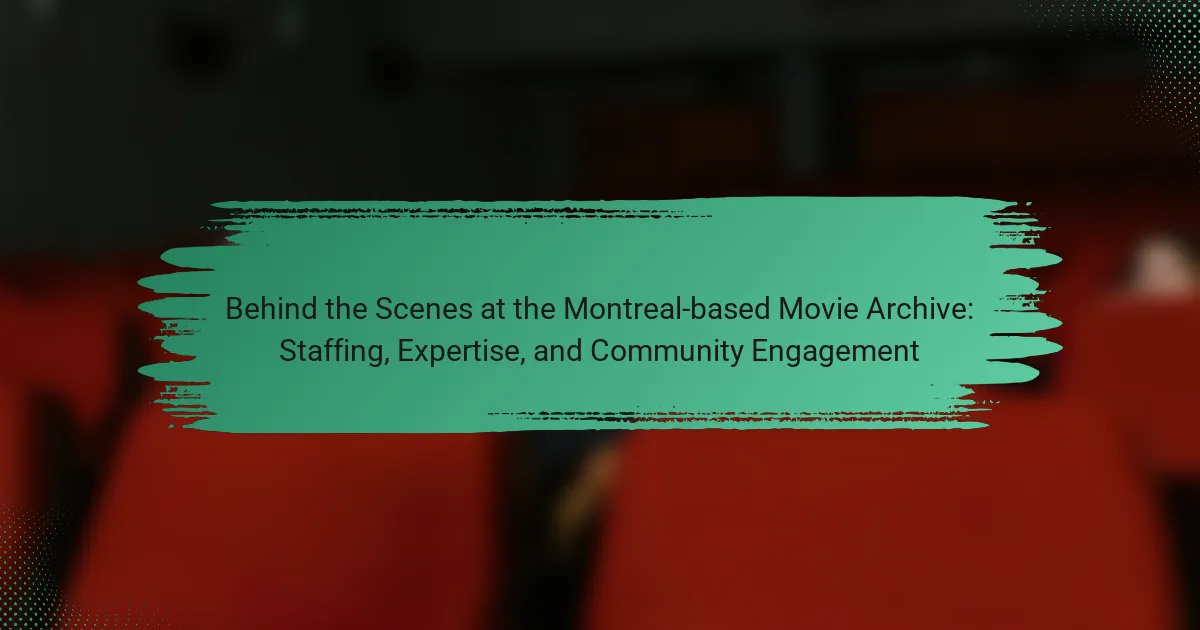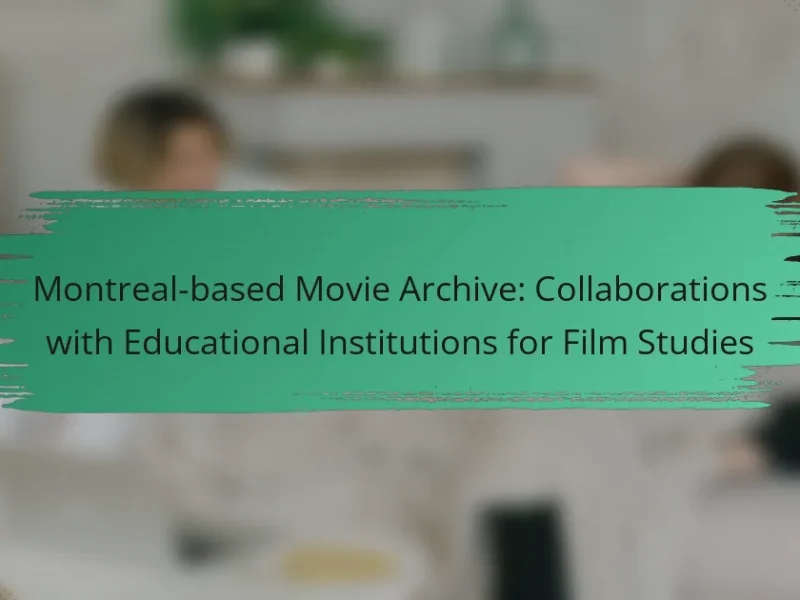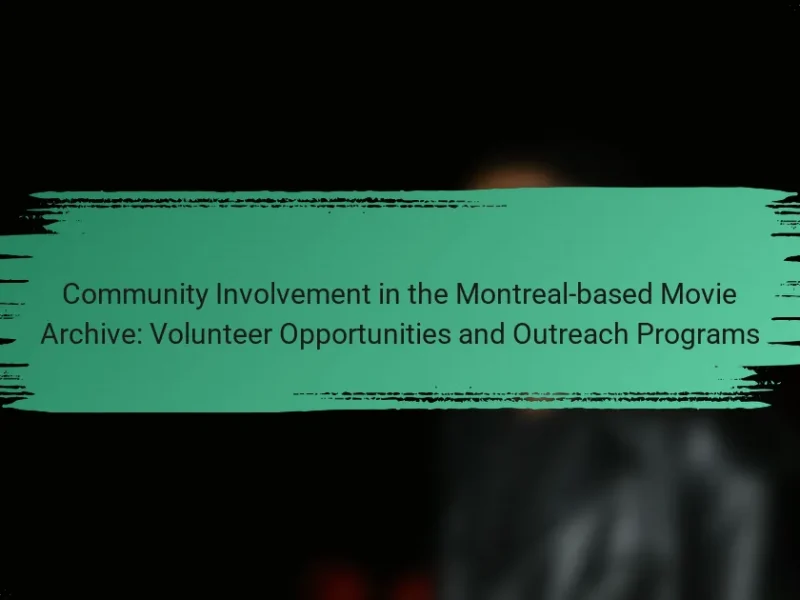The Montreal-based Movie Archive is a key institution dedicated to preserving Canadian film heritage through the collection and cataloging of various film types, including documentaries, feature films, and shorts. Established in the early 2000s, the archive serves as a vital resource for researchers, filmmakers, and the public while engaging in outreach programs to promote film literacy and culture. However, the archive faces significant challenges, including funding shortages that hinder preservation efforts, staffing issues related to specialized expertise, and the need for greater community engagement to attract visitors and raise awareness of its resources. This article explores these critical aspects of the archive’s operations, highlighting the importance of staffing, expertise, and community involvement in fulfilling its mission.

What is the Montreal-based Movie Archive?
The Montreal-based Movie Archive is a repository dedicated to preserving and showcasing Canadian film heritage. It collects, catalogs, and maintains a vast array of films, including documentaries, feature films, and short films. The archive serves as a resource for researchers, filmmakers, and the public. It also engages in community outreach programs to promote film literacy. Established in the early 2000s, the archive plays a crucial role in documenting the evolution of cinema in Canada. Its collections include rare and historical films that are not widely available. The archive collaborates with various cultural institutions to enhance access to its resources.
How does the Montreal-based Movie Archive function?
The Montreal-based Movie Archive functions as a repository for film preservation and access. It collects, catalogues, and maintains a diverse range of films. The Archive employs trained staff who specialize in film preservation techniques. They ensure that the films are stored under optimal conditions to prevent deterioration. The Archive also digitizes films to increase accessibility for researchers and the public. Community engagement is a key aspect of its operation, with regular screenings and educational programs. These initiatives promote awareness of film heritage and encourage public participation. The Archive collaborates with local filmmakers and institutions to enhance its offerings.
What are the main objectives of the Montreal-based Movie Archive?
The main objectives of the Montreal-based Movie Archive are to preserve and promote Canadian cinema. The archive aims to collect, catalog, and safeguard film materials for future generations. It also seeks to enhance public access to these films through screenings and educational programs. The archive is committed to documenting the history of film in Canada. It collaborates with filmmakers and institutions to support film culture. The objective includes fostering community engagement through workshops and events. By doing so, it strengthens the appreciation of cinema within the local community.
What types of films and materials does the archive collect?
The archive collects a variety of films and materials. This includes feature films, documentaries, short films, and experimental cinema. Additionally, the archive acquires television programs and educational films. It also collects film-related materials such as scripts, production notes, and photographs. This diverse collection supports research and preservation of cinematic history. The focus is on both Canadian and international works. The archive aims to document various genres and styles of filmmaking. This approach enriches the cultural heritage available for public access.
What staffing structure supports the Montreal-based Movie Archive?
The staffing structure of the Montreal-based Movie Archive includes a diverse team of professionals. This team consists of archivists, curators, and technical staff. Archivists manage the collection and preservation of films. Curators select and organize film screenings and exhibitions. Technical staff handle the digitization and restoration of archival materials. The structure also incorporates administrative roles for operational support. This staffing model ensures comprehensive expertise in film preservation and community engagement. The collaboration among these roles enhances the archive’s mission to educate and promote film heritage.
What roles are essential in the operation of the archive?
The essential roles in the operation of an archive include archivists, curators, and preservation specialists. Archivists manage the collection and organization of records. They ensure proper cataloging and accessibility of materials. Curators select and interpret items for exhibitions. They engage with the community to promote the archive’s resources. Preservation specialists focus on the conservation of physical materials. They implement techniques to protect items from deterioration. Each role contributes to the effective functioning of the archive, ensuring its resources are preserved and accessible for future generations.
How does the expertise of staff contribute to the archive’s mission?
The expertise of staff significantly enhances the archive’s mission. Skilled staff members ensure the accurate preservation of film materials. Their knowledge in archival practices fosters effective organization and accessibility of collections. Expertise in film history allows staff to curate relevant educational programs. They also engage with the community through outreach initiatives. This builds public interest and promotes cultural heritage. Furthermore, trained staff can assess and restore damaged films, maintaining historical integrity. Their specialized skills directly support the archive’s goal of preserving cinematic history for future generations.
What expertise is required for working at the Montreal-based Movie Archive?
Expertise required for working at the Montreal-based Movie Archive includes film preservation, archiving techniques, and knowledge of film history. Candidates should possess skills in digital restoration and cataloging. Familiarity with metadata standards is essential for organizing film collections. Strong research abilities are also important for contextualizing films. Additionally, teamwork and communication skills are necessary for collaborative projects. Experience with archival software can enhance job performance. A background in library science or a related field is often preferred. These qualifications ensure effective management of the archive’s diverse film assets.
What qualifications do staff members typically possess?
Staff members typically possess qualifications in film studies, archival science, or library science. Many have bachelor’s or master’s degrees in these fields. Experience in film preservation and restoration is also common. Technical skills in digital archiving are often required. Knowledge of cataloging standards is essential for effective organization. Familiarity with film history enhances their expertise. Some staff members may have certifications in archival management. Continuous professional development is encouraged to keep up with industry standards.
How do staff members stay updated on industry trends?
Staff members stay updated on industry trends through various methods. They regularly attend industry conferences and workshops. These events provide insights into the latest developments. Staff members also subscribe to relevant publications and newsletters. This ensures they receive timely information on trends. Networking with peers in the industry is another key strategy. Conversations with colleagues often reveal emerging trends and best practices. Additionally, many staff members engage in online forums and social media groups. These platforms facilitate discussions about current industry challenges and innovations. Collectively, these approaches keep staff informed and adaptable in a dynamic field.

How does the Montreal-based Movie Archive engage with the community?
The Montreal-based Movie Archive engages with the community through various outreach programs. It hosts public screenings to showcase local films. Workshops are organized to educate filmmakers and enthusiasts. The Archive collaborates with schools for educational initiatives. It also partners with local organizations to promote film culture. Community feedback is actively sought to improve offerings. These efforts enhance local engagement and support the film community.
What programs does the archive offer to the public?
The archive offers various programs to the public, including film screenings, workshops, and educational resources. Film screenings feature classic and contemporary films, providing access to diverse cinematic experiences. Workshops are designed for different skill levels and cover topics such as film preservation and editing techniques. Educational resources include online databases and archival materials for research purposes. These programs aim to engage the community and promote film literacy. The archive collaborates with local organizations to enhance its offerings and reach a wider audience.
How does the archive promote film education in the community?
The archive promotes film education in the community through various initiatives. It offers workshops that teach filmmaking techniques. These workshops are designed for all age groups, ensuring inclusivity. The archive also hosts screenings of classic and contemporary films. These screenings often include discussions led by film experts. Additionally, the archive provides resources such as books and online materials. These resources support self-directed learning in film studies. Collaborations with local schools enhance educational outreach. By engaging with the community, the archive fosters a deeper appreciation for cinema.
What partnerships does the archive have with local organizations?
The archive has partnerships with various local organizations. These collaborations include educational institutions and cultural groups. The partnerships aim to promote film heritage and community engagement. For example, the archive works with local schools for educational programs. They also collaborate with cultural festivals to showcase films. These partnerships enhance the archive’s outreach and accessibility. They help in preserving local film history. Overall, the partnerships strengthen community ties and support cultural initiatives.
Why is community engagement important for the Montreal-based Movie Archive?
Community engagement is crucial for the Montreal-based Movie Archive because it fosters collaboration and support. Engaging the community helps in collecting diverse film materials and stories. This involvement enriches the archive’s collections and makes them more representative of local culture. Community members can provide valuable insights and knowledge about historical films. Additionally, engagement increases public awareness and appreciation of the archive’s work. It also encourages local participation in events and educational programs. Ultimately, strong community ties enhance the archive’s relevance and sustainability.
How does community feedback shape the archive’s initiatives?
Community feedback directly influences the archive’s initiatives by informing decision-making processes. It allows the archive to align its projects with the interests and needs of the community. Feedback is gathered through surveys, public forums, and direct interactions. This input helps prioritize collections, exhibitions, and educational programs. For instance, when community members express interest in local history, the archive may focus on acquiring related materials. Additionally, feedback can highlight gaps in representation, prompting the archive to diversify its offerings. Engaging with the community fosters a sense of ownership and encourages participation in archive initiatives. This collaborative approach enhances the archive’s relevance and effectiveness in serving its audience.
What impact does community involvement have on the archive’s success?
Community involvement significantly enhances the archive’s success. Engaged communities contribute valuable local knowledge and resources. This collaboration leads to more comprehensive collections. Active participation fosters a sense of ownership among community members. Increased public interest and attendance at events typically follow. Strong community ties can also attract funding and support. Research shows that archives with community engagement initiatives report higher user satisfaction. Effective outreach efforts build lasting relationships that benefit both the archive and the community.

What challenges does the Montreal-based Movie Archive face?
The Montreal-based Movie Archive faces funding shortages that limit its operational capacity. These financial constraints hinder the preservation of films and digitalization efforts. Additionally, the archive struggles with staffing issues. There is a lack of specialized expertise in archival practices. This expertise is crucial for maintaining and cataloging the collection. Furthermore, community engagement poses a challenge. The archive needs to attract more visitors and raise awareness about its resources. These challenges collectively impact the archive’s ability to fulfill its mission effectively.
How does the archive address funding and resource challenges?
The archive addresses funding and resource challenges through diversified funding sources and community partnerships. It actively seeks grants from governmental and private organizations. The archive also engages in fundraising events to supplement its budget. Collaborations with educational institutions provide additional resources and expertise. Volunteer programs enhance staffing without incurring significant costs. These strategies ensure the archive remains sustainable despite financial constraints.
What strategies are employed to attract donations and grants?
Nonprofit organizations employ various strategies to attract donations and grants. These strategies include building strong relationships with potential donors. Engaging storytelling is vital in conveying the mission and impact of the organization. Social media platforms are utilized to reach a broader audience. Regular updates and newsletters keep supporters informed and involved. Grant writing expertise is essential for crafting compelling proposals. Networking within the community can lead to partnerships and sponsorships. Hosting events can create opportunities for direct engagement with potential donors. Transparency about financial needs and project outcomes fosters trust among supporters.
How does the archive manage preservation challenges?
The archive manages preservation challenges through a combination of advanced technology and expert knowledge. It employs climate-controlled storage to protect sensitive materials. Regular assessments of collection conditions are conducted to identify potential risks. Digital preservation techniques are utilized to create backups of fragile content. Staff members are trained in best practices for handling and conserving various media types. Collaboration with other institutions enhances resource sharing and expertise. The archive also engages with the community to raise awareness about preservation needs. These strategies collectively ensure the longevity of the archive’s collections.
What are the future goals for the Montreal-based Movie Archive?
The future goals for the Montreal-based Movie Archive include expanding its digital collection. This aims to enhance accessibility for researchers and the public. The Archive plans to improve community engagement through educational programs. These initiatives will foster a deeper appreciation for film heritage. Additionally, the Archive seeks to collaborate with local filmmakers. This collaboration will promote contemporary cinema alongside historical preservation. The goal is to create a platform for diverse voices in filmmaking. Overall, these objectives aim to solidify the Archive’s role as a cultural hub.
How does the archive plan to expand its collection?
The archive plans to expand its collection through targeted outreach and collaboration. It aims to engage with local filmmakers and communities. This initiative will encourage donations of films and related materials. The archive also intends to utilize social media to raise awareness. By promoting its mission, the archive hopes to attract new contributors. Additionally, it will host events to showcase its existing collection. These events will serve as a platform for community involvement. Overall, the strategy focuses on building relationships to enhance the collection.
What innovations are being considered for community outreach?
Innovations being considered for community outreach include digital storytelling platforms and interactive workshops. These platforms allow community members to share their narratives through multimedia. Interactive workshops facilitate hands-on learning experiences related to film and archiving. Additionally, partnerships with local organizations are being explored to enhance outreach effectiveness. Utilizing social media for engagement is another strategy under consideration. These innovations aim to foster deeper connections with the community. They also seek to increase participation in archival projects.
What best practices can be learned from the Montreal-based Movie Archive?
The Montreal-based Movie Archive demonstrates best practices in film preservation, community engagement, and staff training. It emphasizes the importance of digitizing and cataloging films to ensure accessibility. The archive also actively collaborates with local filmmakers and organizations to promote cultural heritage. Furthermore, it invests in training programs for staff to enhance expertise in archival methods. Regular community events help to raise awareness and appreciation for film history. Data shows that such practices increase public interest and participation in film-related activities. These strategies contribute to a sustainable model for film archives globally.
The Montreal-based Movie Archive is a vital institution dedicated to preserving Canadian film heritage through the collection, cataloging, and maintenance of diverse film materials. This article outlines the archive’s operational structure, including staffing roles and expertise essential for film preservation and community engagement. It highlights the archive’s objectives, community outreach initiatives, challenges faced, and future goals aimed at enhancing accessibility and promoting film literacy. Key strategies for collaboration with local filmmakers and organizations are also discussed, emphasizing the importance of community involvement in the archive’s success.


